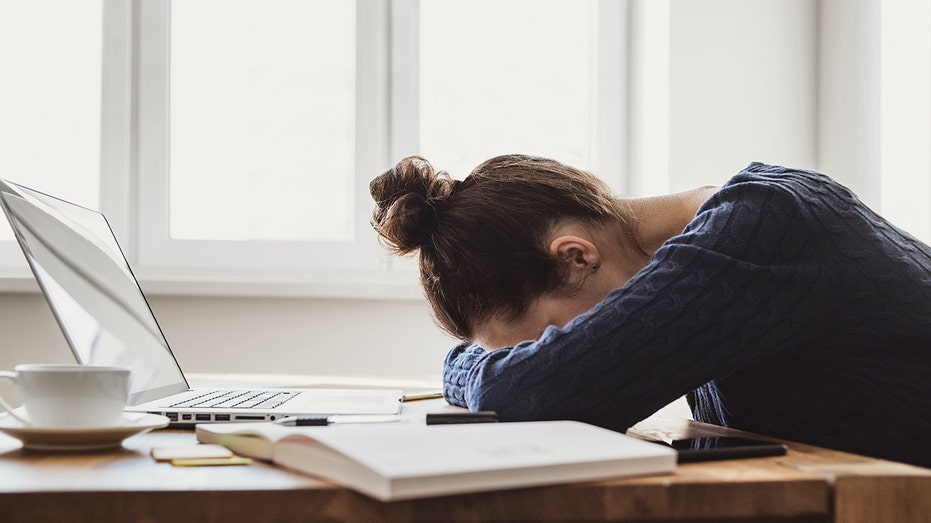Check out what’s clicking on FoxBusiness.com
Groggy and disoriented on Monday morning after a weekend of late nights? “Social jet lag” may be to blame, sleep experts say, an inconsistency of sleep schedules that research suggests could have as much of an impact on health as how much sleep one gets.
Almost half of U.S. adults experience some social jet lag, according to a new study published Tuesday in the journal JAMA Network Open. The term refers to the mismatch between a person’s biological time, which is determined by circadian rhythms, the roughly 24-hour cycles driven by an internal body clock, and their social clock, which is influenced by obligations such as work and school, as well as social activities.
Like travel-related jet lag, which one might experience when visiting a place with a different time zone, social jet lag is a type of circadian misalignment, sleep experts say, in which the body’s circadian rhythm becomes out of sync with the environment. But unlike travel jet lag, which is usually short-lived, social jet lag can be chronic and cause fewer obvious symptoms.

A person’s social clock is influenced by social activities and obligations such as work and school. (iStock / iStock)
AMAZON TO RELEASE HALO RISE LATER THIS YEAR: A BEDSIDE ALARM CLOCK AND SLEEP TRACKING DEVICE
“Jet lag can have a much more dramatic effect on people acutely. You feel jet lag when you travel,” said Aric Prather, a psychologist at the University of California, San Francisco, who treats insomnia and wasn’t involved in the study. “Social jet lag is more insidious. It’s often hiding in plain sight, though it may have an impact on our health.”
Social jet lag is measured by calculating the difference in time between the midpoint of sleep on work days and on nonwork days. Social jet lag has been associated with higher risks for depression, obesity, Type 2 diabetes and cardiovascular problems, earlier research shows. It has also been linked to less healthy eating habits and poorer academic performance. The greater the social jet lag, the worse the health outcomes can be, research suggests. And this can be true even if a person is getting the recommended amount of sleep, sleep experts say. The Centers for Disease Control and Prevention recommends that adults sleep for at least seven hours.
“Insufficient sleep is bad for our health. And so are our sleep schedules,” said Dr. Prather. “What’s interesting is the risk for disease can be independent of sleep duration.”

One-fifth of the study’s participants reported that they slept two hours or more on nonwork days than work days.
HOW TO ESCAPE YOUR PACKED SCHEDULE AND TAKE A REST FROM WORK
Sleep experts said more research is needed to understand why social jet lag might be bad for health. What is known is that circadian rhythms coordinate most physiological functions, and most of the body’s cells have their own internal clock.
“We know circadian rhythm plays an important role in our health,” Dr. Prather said. “Maybe there’s something going on with circadian clocks that might be driving the problem. It’s still an emerging science.”
About 47% of U.S. adults studied in the recent paper reported social jet lag of an hour or more. One-fifth of participants reported social jet lag of two hours or more, the analysis of about 9,000 adults found. It is the first large-scale study to compare the sleep duration of U.S. adults on work days and nonwork days separately, according to the study’s authors.

A long night out can lead to a mismatch between the number of hours of sleep on work days and nonwork days.
CLICK HERE TO GET THE FOX BUSINESS APP
“One hour of social jet lag is like traveling one time zone, without even traveling,” or going through daylight-saving time, said Susheel Patil, director of sleep medicine at Ohio’s University Hospitals system, who wasn’t involved in the study. “They may have difficulties falling asleep, staying awake, waking up appropriately or waking up earlier than they might expect.”
And while a person can likely adapt well enough to a short bout of social jet lag, chronic circadian disruptions could be damaging to health, Dr. Patil said.
Daylight-saving time, which kicked in last weekend, could be considered a type of social jet lag at a large scale and could exacerbate existing circadian misalignment, sleep experts said.
Participants in the study, on average, slept more, and went to sleep later and awoke later on nonwork days, the analysis said. Participants reported sleeping an average of 7.5 hours on work days and 8.2 hours on nonwork days. About one-quarter of adults surveyed slept less than seven hours on work days, the study said. The analysis was based on 2017 to 2020 data from the CDC’s National Health and Nutrition Examination Survey, which assesses a nationally representative sample of about 5,000 adults and children around the country every year.
A significant proportion of U.S. adults in the study reported other issues with their sleep. About 30% said they had trouble sleeping and more than a quarter said they experienced daytime sleepiness.
“Sleep and timing of sleep is important, and need to be prioritized as part of overall healthy living,” said Dr. Patil.
GET FOX BUSINESS ON THE GO BY CLICKING HERE
Some best practices for sleep that experts recommend include having a consistent sleep schedule, cultivating a calming and restorative pre-bed routine and sleep environment, and practicing stress management during the day.
“In sleep medicine, we think about what you can do to optimize both sleep health and circadian health,” Dr. Patil said. “Even if you might be getting adequate amounts of sleep, a misalignment of the circadian system will eventually impact your sleep as well. You don’t feel as good as when both systems are operating well.”


